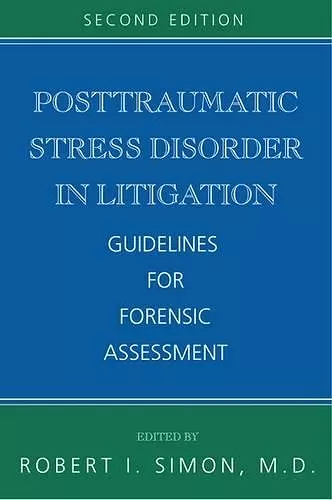Posttraumatic Stress Disorder in Litigation
Guidelines for Forensic Assessment
Format:Hardback
Publisher:American Psychiatric Association Publishing
Published:1st Mar '04
Currently unavailable, and unfortunately no date known when it will be back

Robert Simon M.D., is widely recognized as a leader in contemporary American forensic psychiatry. This second edition of his already classic book builds and extends it value for clinicians and educators. It is one of the volumes that I will continue to recommend to my students and colleagues. He is to be congratulated for his on-going contribution in our field. Richard Rosner, M.D., Clinical Professor, Department of Psychiatry, New York University School of Medicine; Director, Forensic Psychiatry Residency, New York University Medical Center
This essential collection by 13 leading U.S. experts sheds important new light on forensic guidelines for effective assessment and diagnosis and determination of disability, serving both plaintiffs and defendants in litigation involving PTSD claims.
The terrorist attacks on the World Trade Center in September 2001 turned PTSD into a household word. But posttraumatic stress disorder has been documented throughout history: For example, as long ago as 1666, Samuel Pepys wrote in his diary that he still had night terrors 6 months after the great fire of London. PTSD, officially recognized as a diagnosis by DSM-III in 1980, is only the most recent term used to describe the suffering of trauma victims.
Few could have foreseen its profound impact on litigation. Often dubbed the "black hole" of litigation—where allegations are relatively easy to assert but difficult to defend because the symptoms are subjective—PTSD has deeply influenced civil and criminal law in cases ranging from malpractice and personal injury to sexual harassment and child abuse. It is thus vital for all legal parties involved that forensic examiners perform credible psychiatric and psychological examinations of PTSD claimants.
Intended to add direction and discipline to the forensic assessment of PTSD litigants, this expanded second edition begins with an updated chapter on current and future trends for the role of PTSD in litigation.
• Chapter 2 notes the increasing evidence that exposure to multiple events not only is more common than previously thought but also increases the risk for development of PTSD following the target event.
• Chapter 3 details diagnostic criteria and guidelines for the forensic psychiatric examination of the PTSD claimant.
• Most literature discusses PTSD in adults. Chapter 4 offers a rare perspective on PTSD in children and adolescents, including parental response to the trauma, developmental effects, and delayed onset symptoms.
• Forensic assessment of PTSD claimants is presented in Chapter 5, followed by new chapters on disability determinants (how PTSD impairs occupational functioning) and PTSD in the workplace, where the causal relationship between employment stress and a resulting mental or emotional disorder must be determined.
• Chapter 8 covers guidelines for malingering in PTSD, where the claimant may be motivated by financial gain or by a reduced charge resulting from an insanity defense.
• A...
This book is a welcome update to the first edition and provides readers with a thorough, well balanced, and comprehensive view of forensic assessment of individuals claiming psychiatric difficulty secondary to PTSD. The authors are well known and experienced in their respective fields, and are able to relate important and complicated issues in a relevant, easy to understand manner. This work also provides readers with essential guidelines and encourages a scientific approach for the assessment of these complex legal cases. In their attempt to raise the bar for forensic practitioners, the authors provide an invaluable resource for mental health and legal professionals involved in PTSD evaluation and litigation. An extensive list of references at the end of each chapter also provides the reader with links to further relevant information for those interested in exploring the topic in more depth.
-- Steven T. Herron, M.D. * Doody's Health Science Review *A vital resource for any forensics expert who testifies in court to understand lines of questioning by attorneys, as well as for psychological forensics experts who must perform retrospective psychological analyses.
-- J. A. Brown, Education America * CHOICE Magazine *The book includes a thorough analysis of the problem areas in the forensic assessment of PTSD litigants. The guidelines proposed in each chapter are practical and clearly written. This book is recommended for both clinicians and attorneys who work in the area of PTSD litigation.
* Psychiatric ServicISBN: 9781585620661
Dimensions: 229mm x 152mm x 20mm
Weight: 567g
272 pages
Second Edition